Thomas James Richards, Diaries, Transcript Vol. 1, 26 August 1914 to 24 April 1915 - Part 5
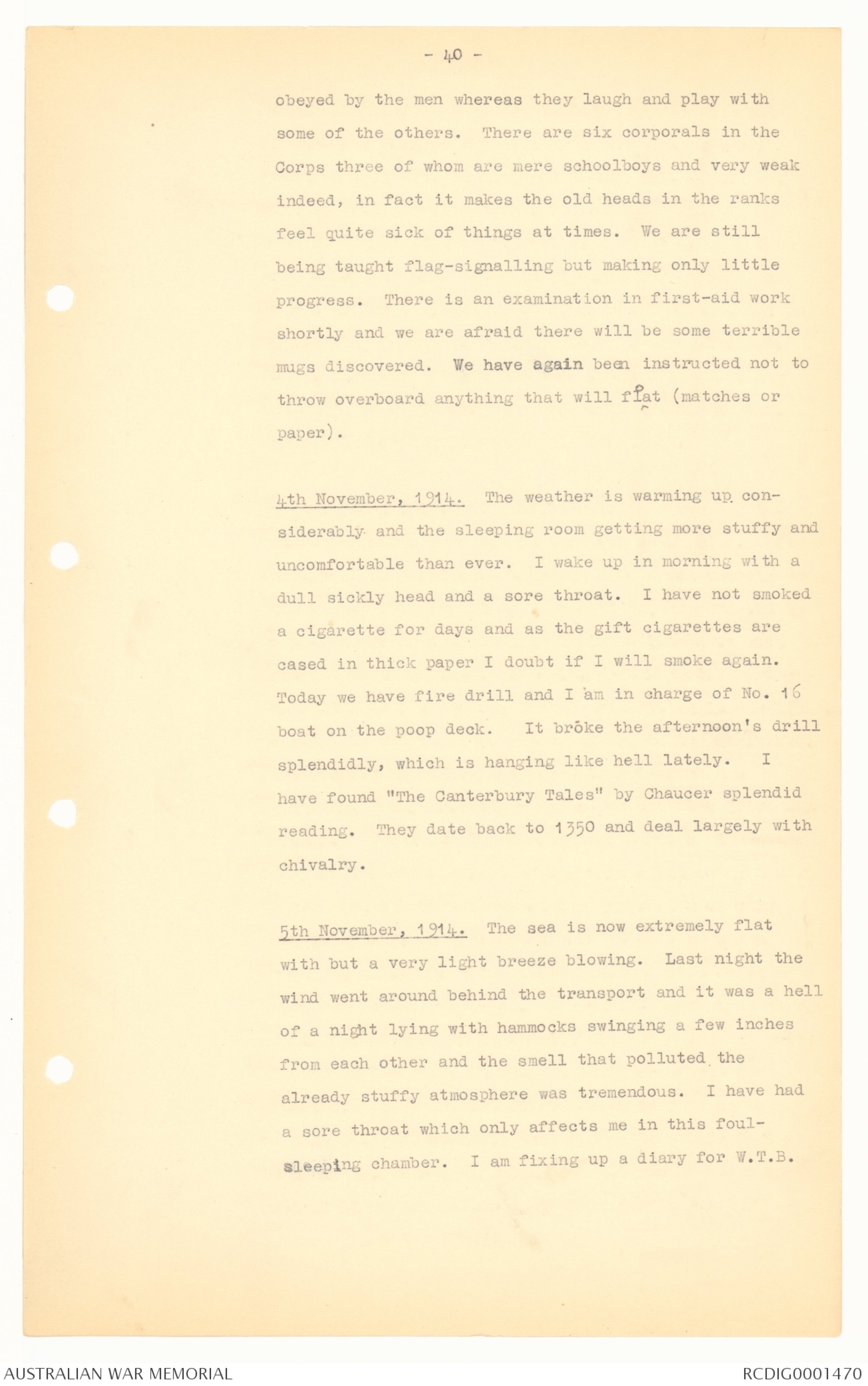
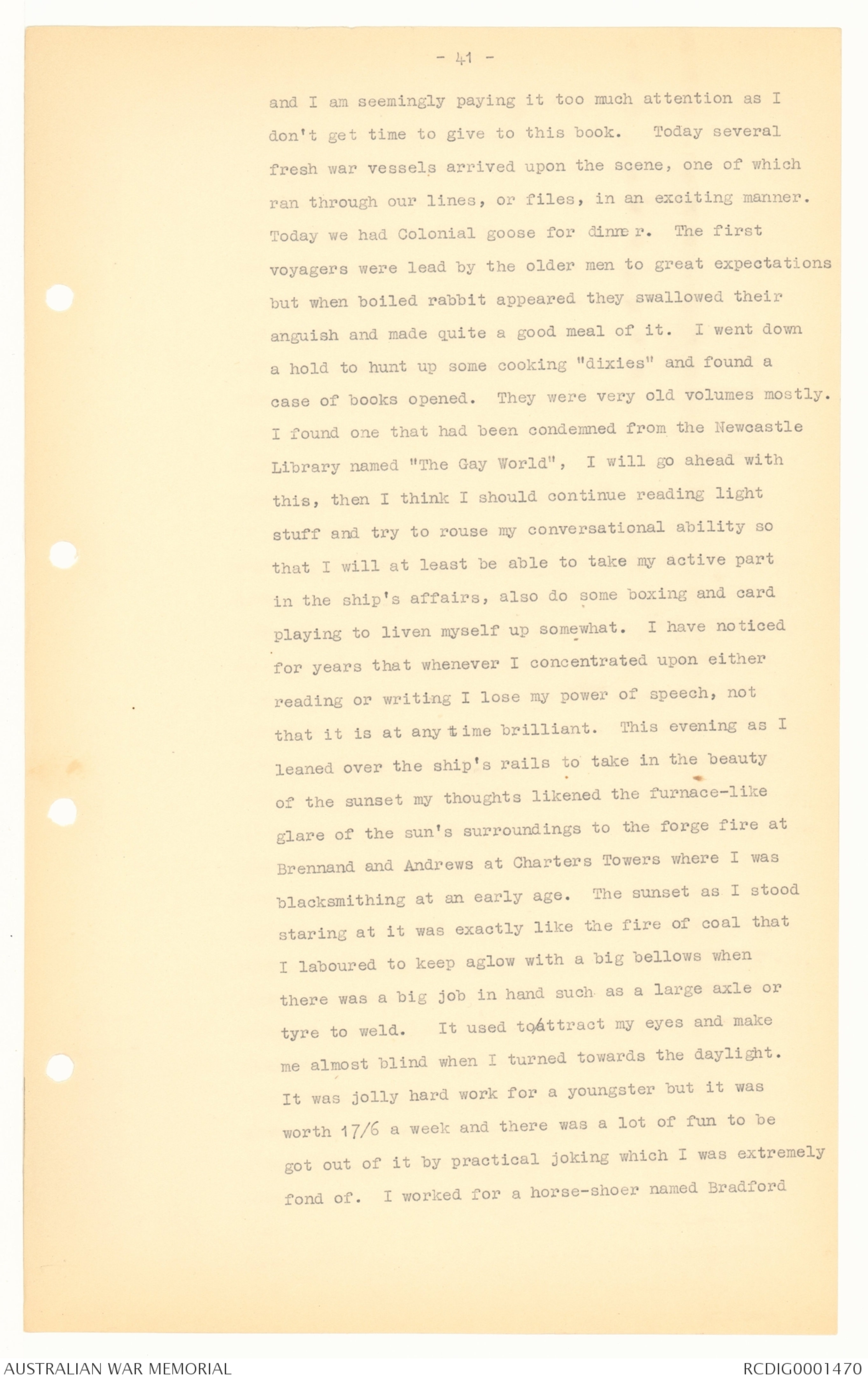
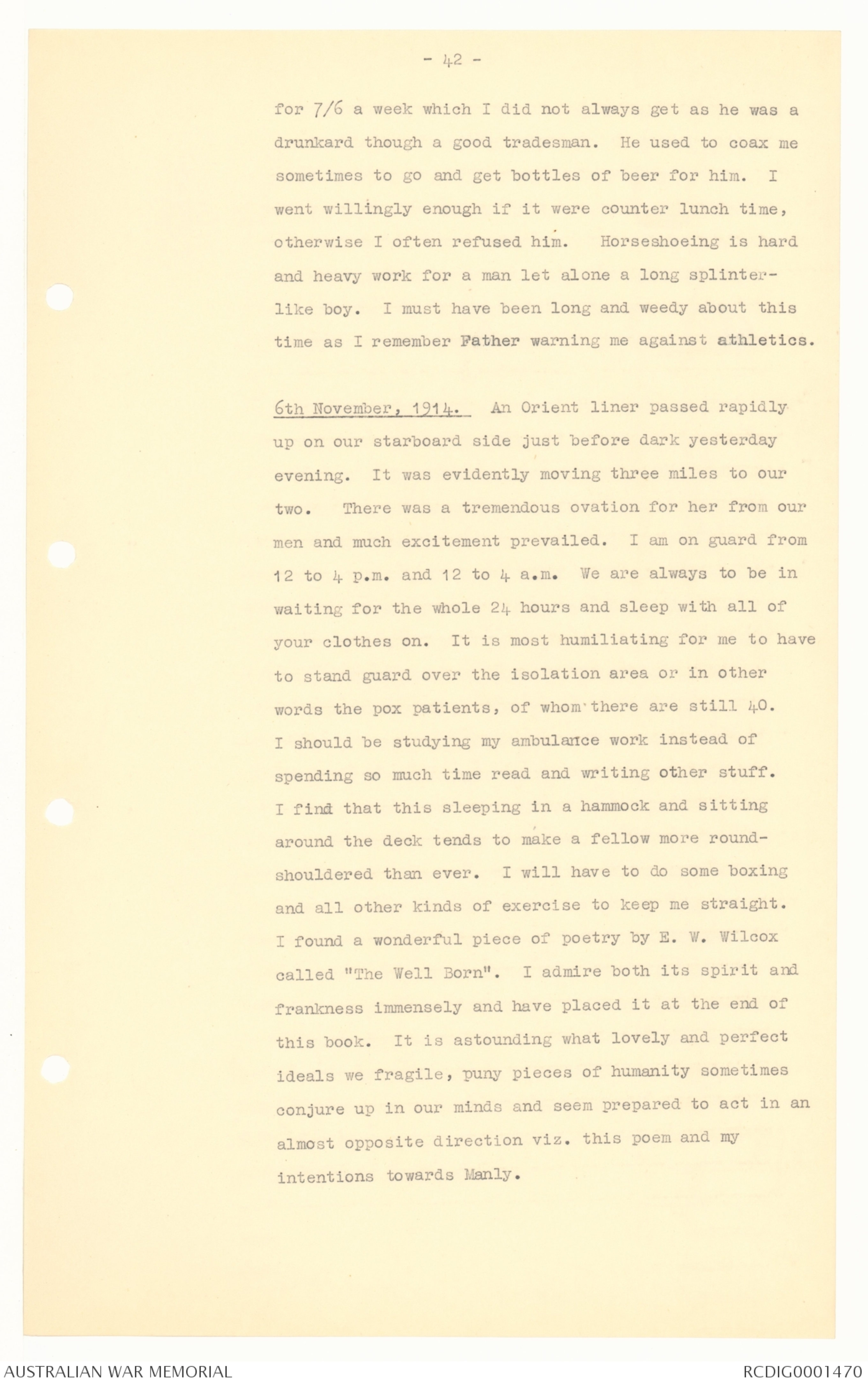
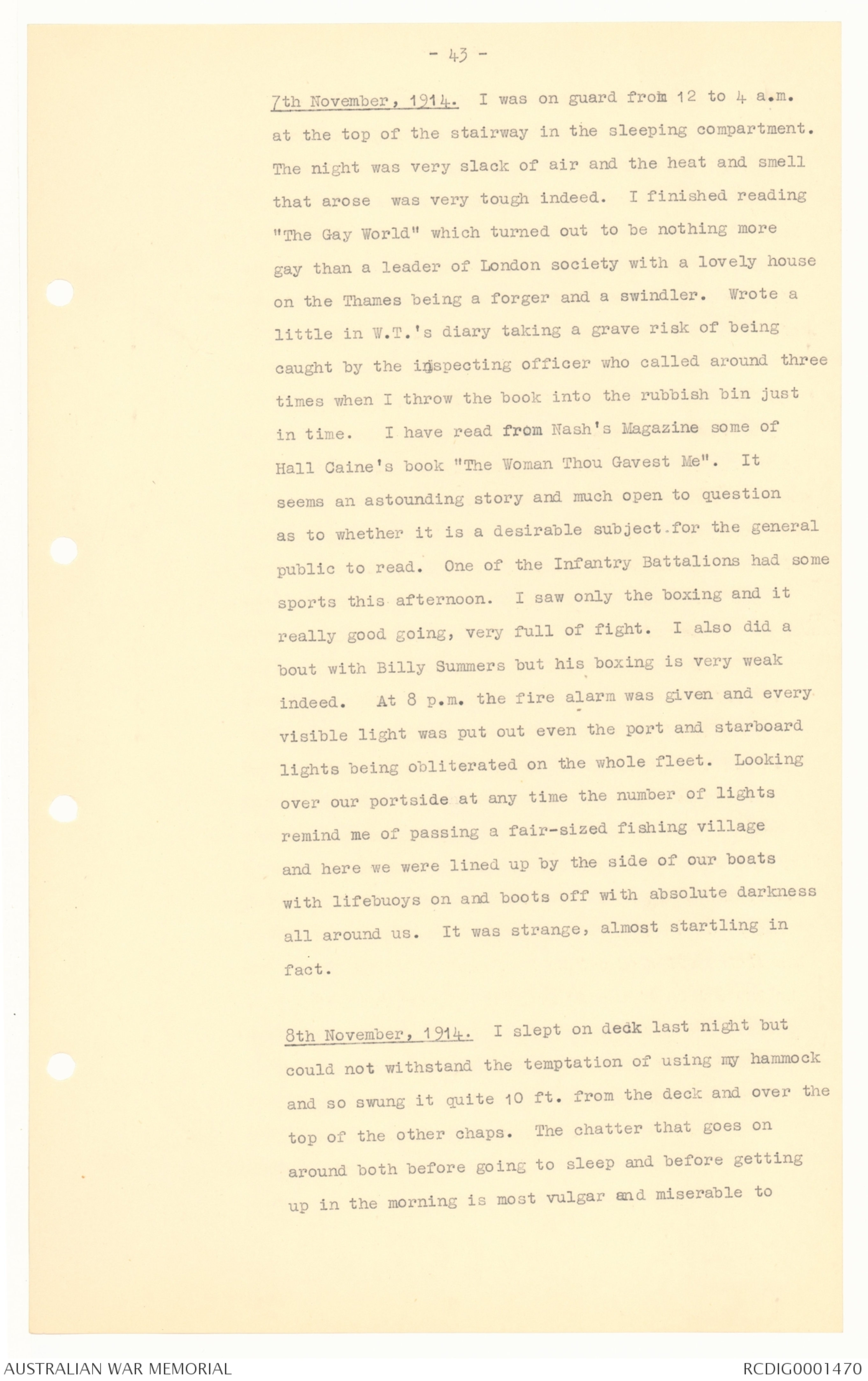
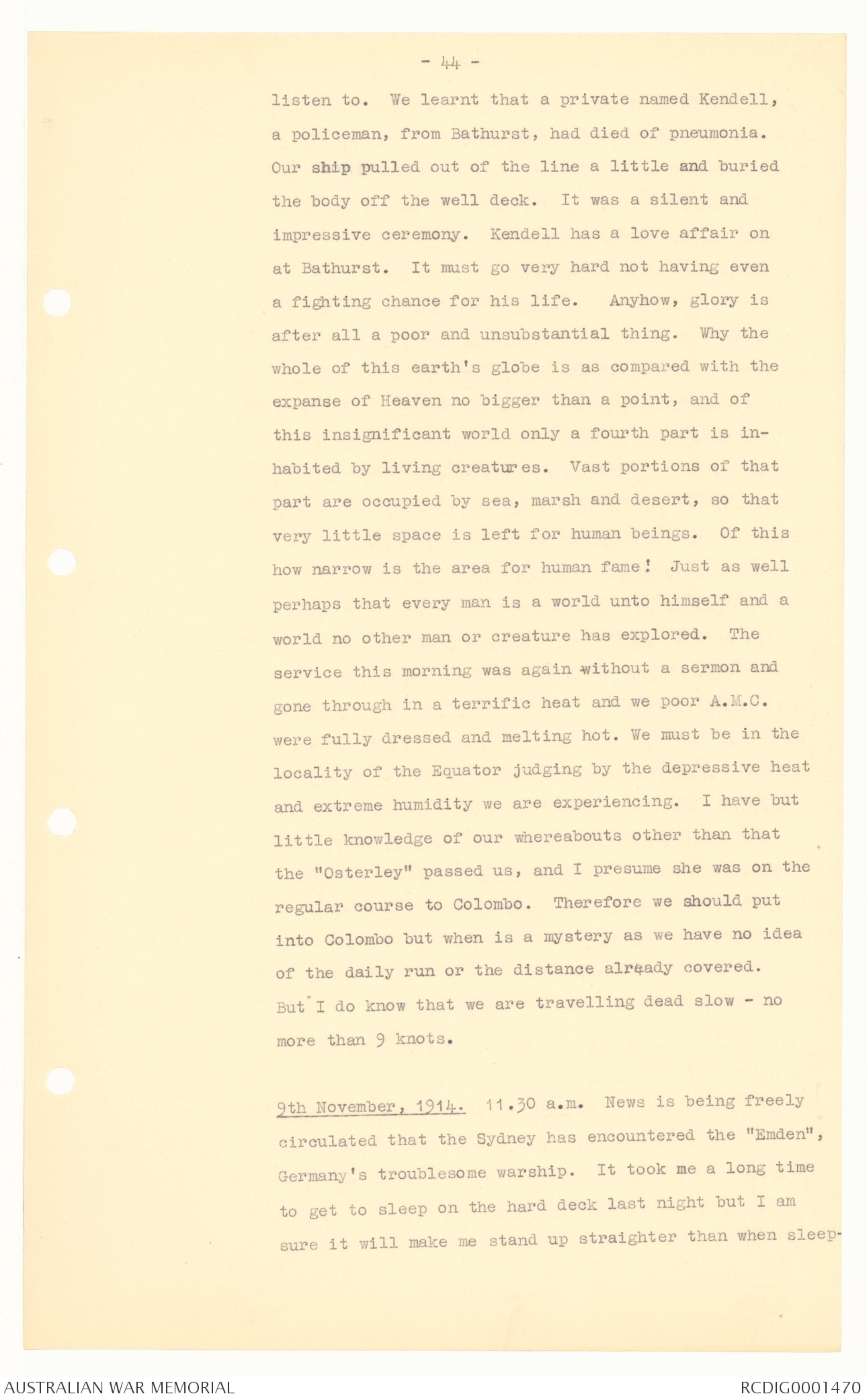
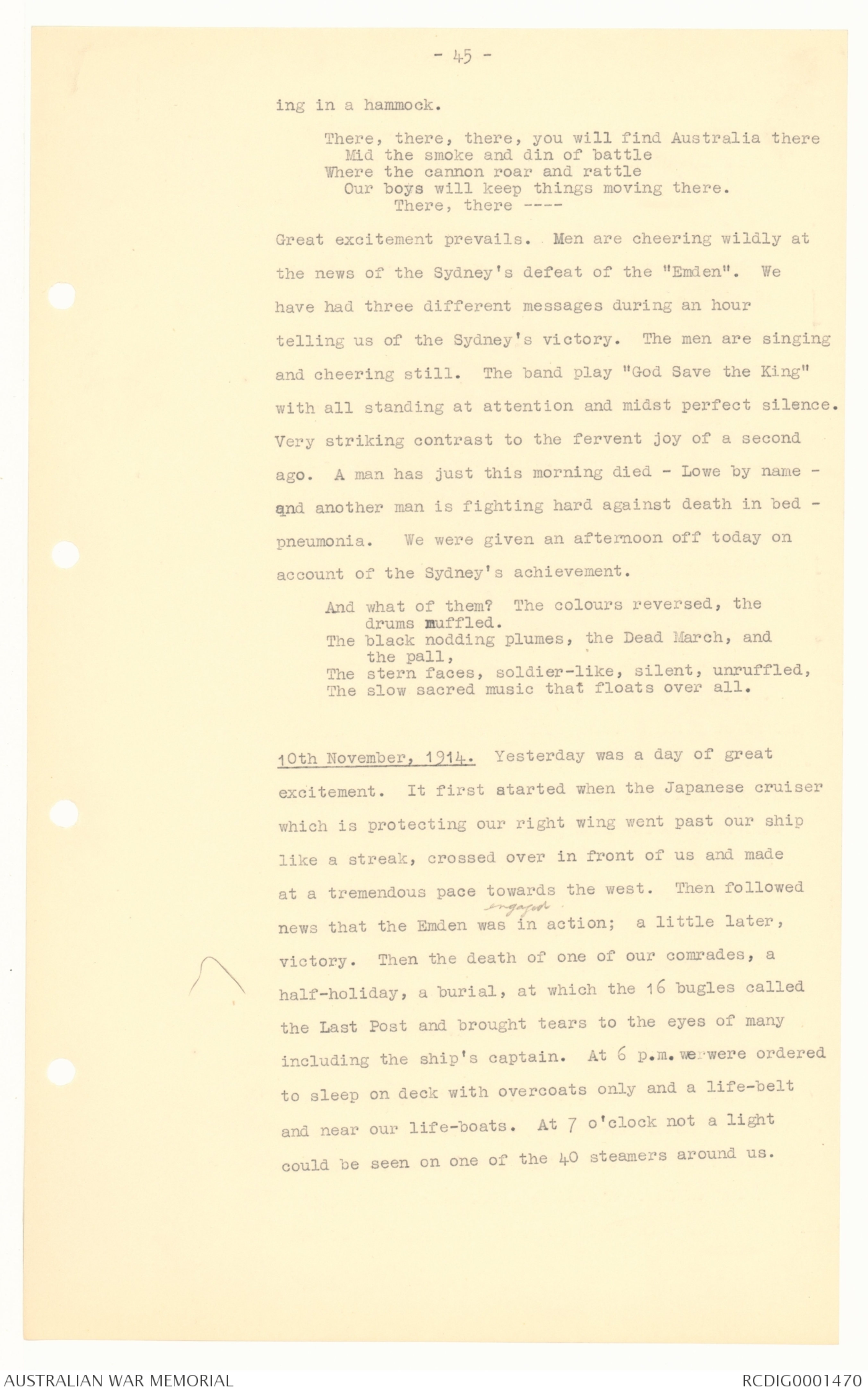
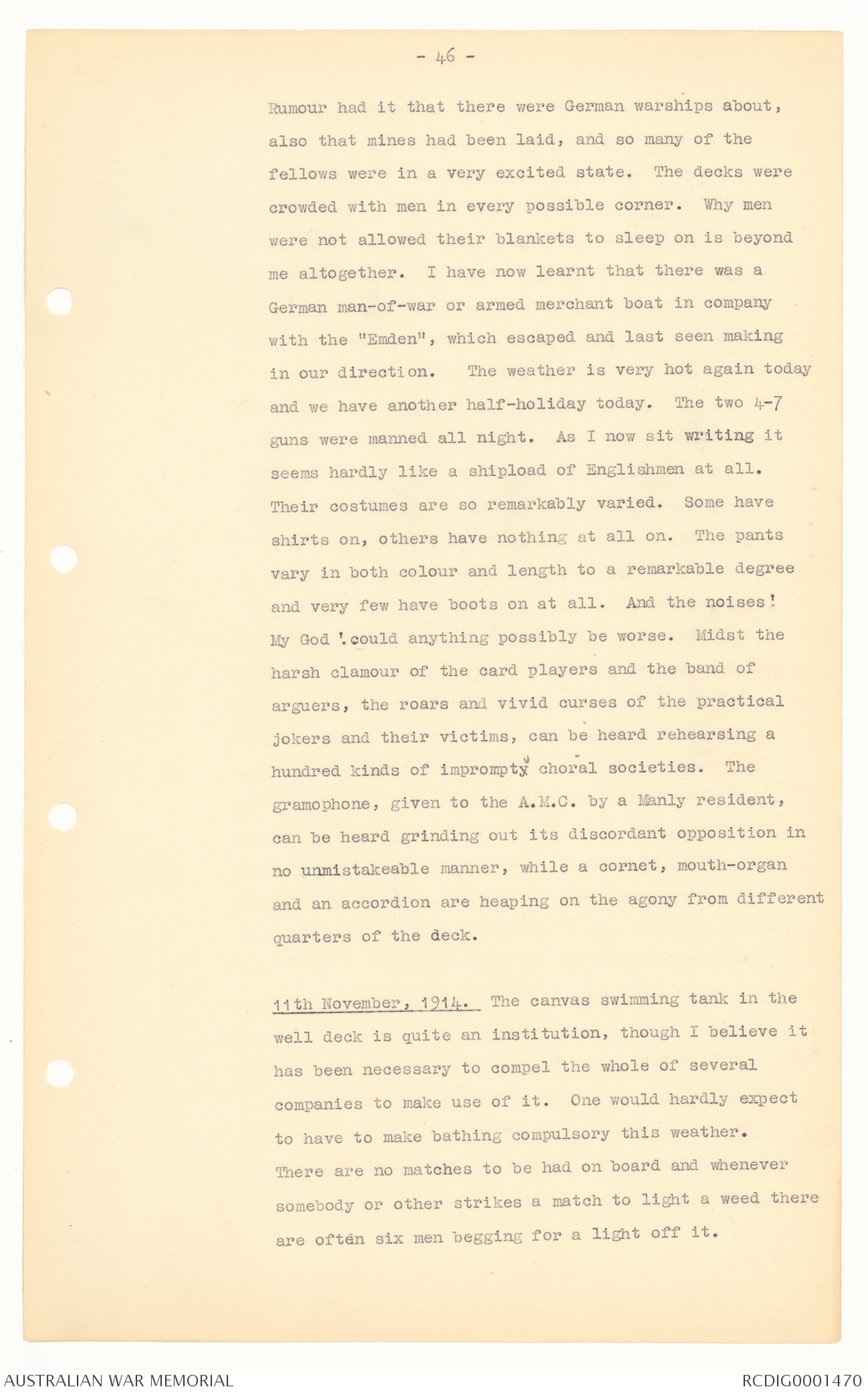
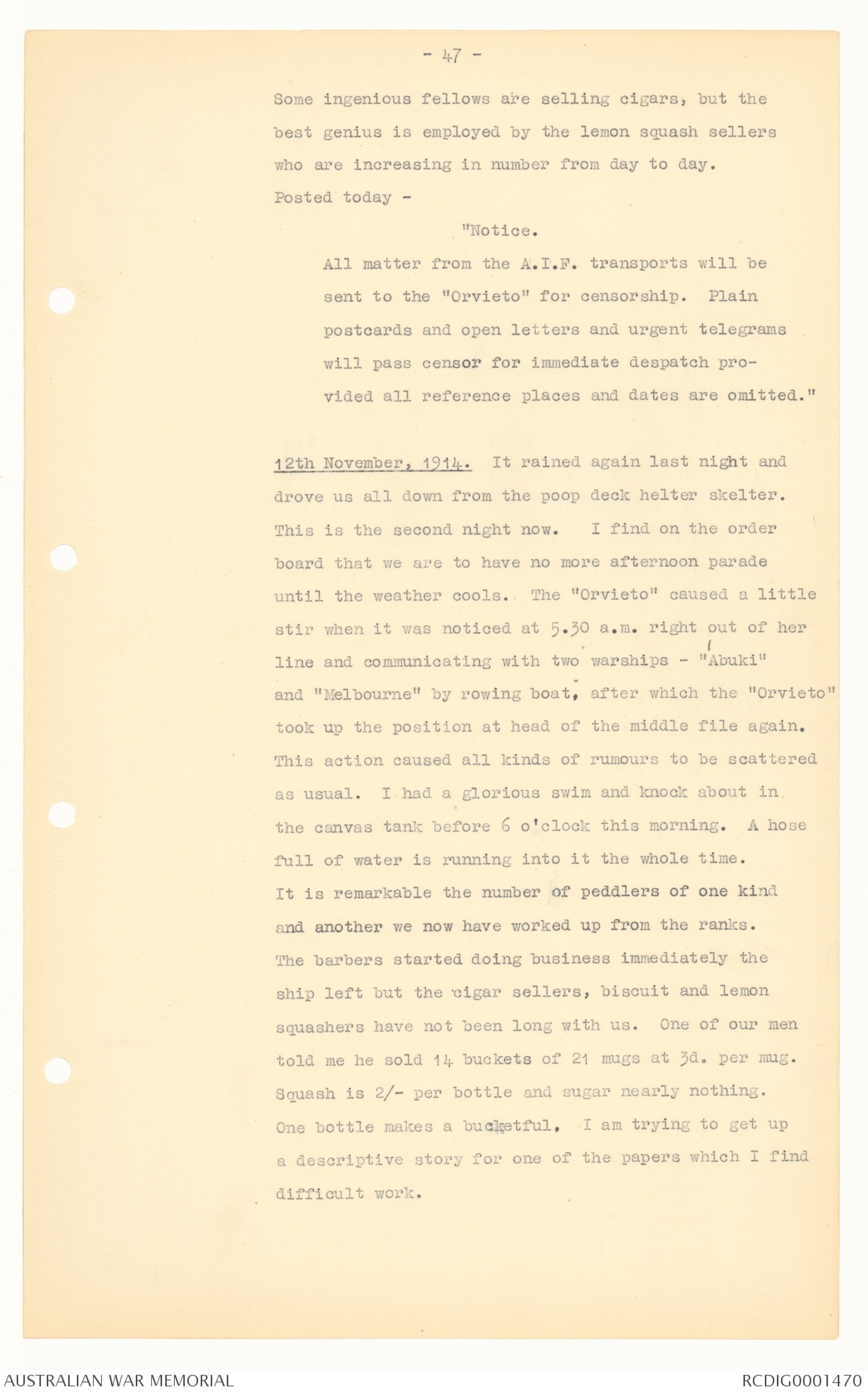
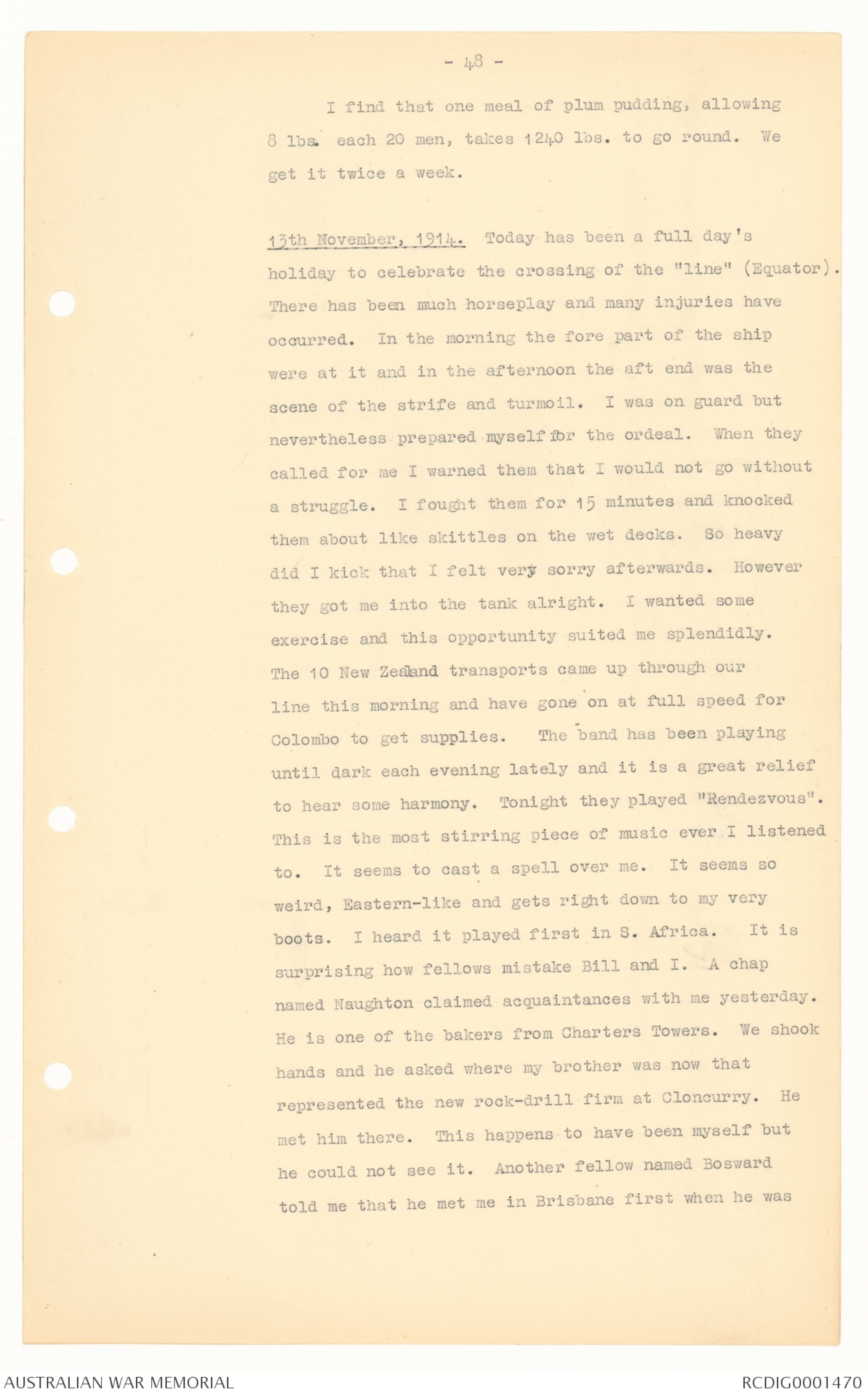
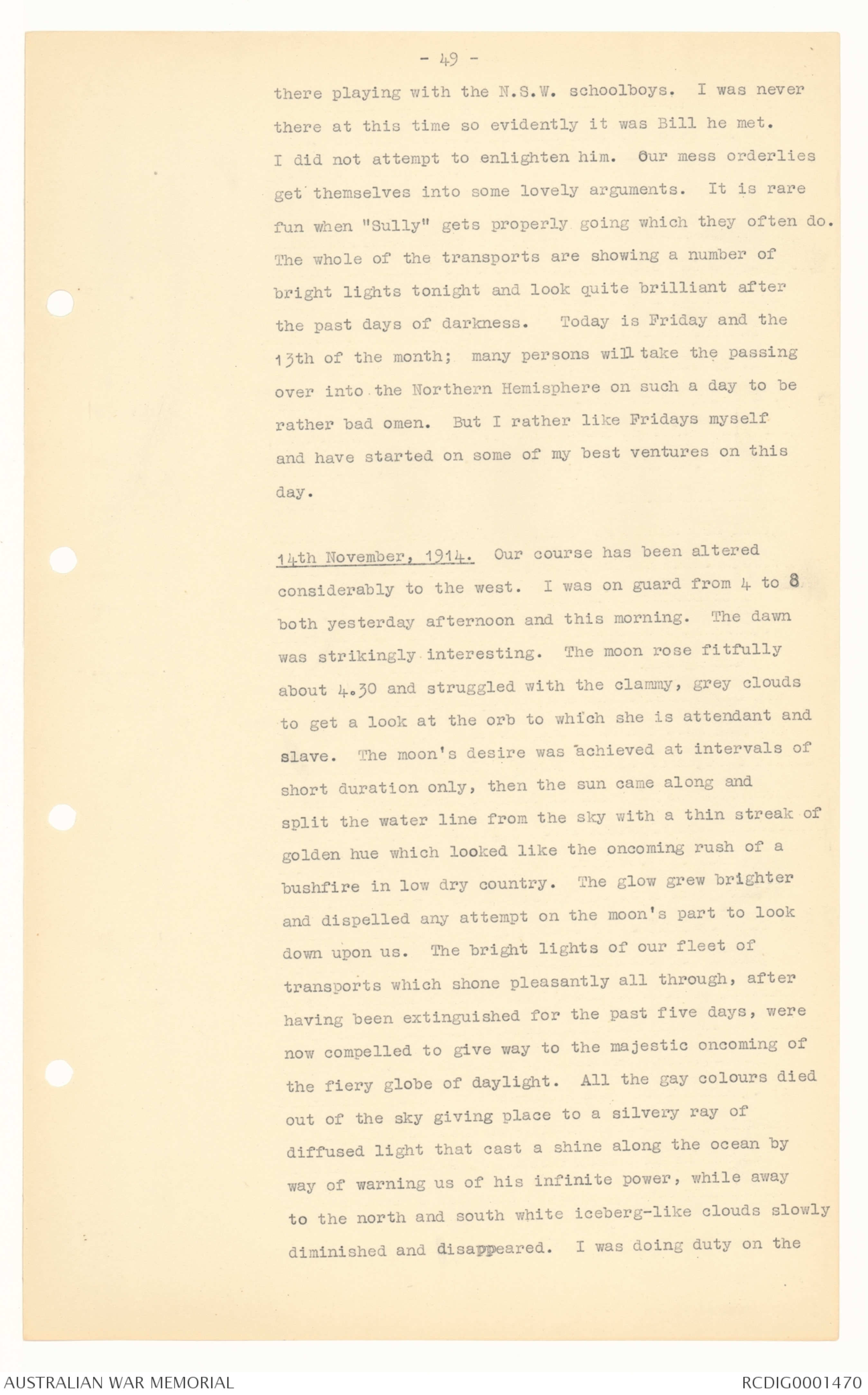
- 40 -
obeyed by the men whereas they laugh and play with
some of the others. There are six corporals in the
Corps three of whom are mere schoolboys and very weak
indeed, in fact it makes the old heads in the ranks
feel quite sick of things at times. We are still
being taught flag-signalling but making only little
progress. There is an examination in first-aid work
shortly and we are afraid there will be some terrible
mugs discovered. We have again been instructed not to
throw overboard anything that will fl^oat (matches or
paper).
4th November, 1914. The weather is warming up considerably
and the sleeping room getting more stuffy and
uncomfortable than ever. I wake up in morning with a
dull sickly head and a sore throat. I have not smoked
a cigarette for days and as the gift cigarettes are
cased in thick paper I doubt if I will smoke again.
Today we have fire drill and I am in charge of No. 16
boat on the poop deck. It broke the afternoon's drill
splendidly, which is hanging like hell lately. I
have found "The Canterbury Tales" by Chaucer splendid
reading. They date back to 1350 and deal largely with
chivalry.
5th November, 1914. The sea is now extremely flat
with but a very light breeze blowing. Last night the
wind went around behind the transport and it was a hell
of a night lying with hammocks swinging a few inches
from each other and the smell that polluted the
already stuffy atmosphere was tremendous. I have had
a sore throat which only affects me in this foul-sleeping
chamber. I am fixing up a diary for W.T.B.
- 41 -
and I am seemingly paying it too much attention as I
don't get time to give to this book. Today several
fresh war vessels arrived upon the scene, one of which
ran through our lines, or files, in an exciting manner.
Today we had Colonial goose for dinner. The first
voyagers were lead by the older men to great expectations
but when boiled rabbit appeared they swallowed their
anguish and made quite a good meal of it. I went down
a hold to hunt up some cooking "dixies" and found a
case of books opened. They were very old volumes mostly.
I found one that had been condemned from the Newcastle
Library named "The Gay World", I will go ahead with
this, then I think I should continue reading light
stuff and try to rouse my conversational ability so
that I will at least be able to take my active part
in the ship's affairs, also do some boxing and card
playing to liven myself up somewhat. I have noticed
for years that whenever I concentrated upon either
reading or writing I lose my power of speech, not
that it is at any time brilliant. This evening as I
leaned over the ship's rails to take in the beauty
of the sunset my thoughts likened the furnace-like
glare of the sun's surroundings to the forge fire at
Brennan and Andrews at Charters Towers where I was
blacksmithing at an early age. The sunset as I stood
staring at it was exactly like the fire of coal that
I laboured to keep aglow with a big bellows when
there was a big job in hand such as a large axle or
tyre to weld. It used to/attract my eyes and make
me almost blind when I turned towards the daylight.
It was jolly hard work for a youngster but it was
worth 17/6 a week and there was a lot of fun to be
got out of it by practical joking which I was extremely
fond of. I worked for a horse-shoer named Bradford
- 42 -
for 7/6 a week which I did not always get as he was a
drunkard though a good tradesman. He used to coax me
sometimes to go and get bottles of beer for him. I
went willingly enough if it were counter lunch time,
otherwise I often refused him. Horseshoeing is hard
and heavy work for a man let alone a long splinter-
like boy. I must have been long and weedy about this
time as I remember Father warning me against athletics.
6th November, 1914. An Orient liner passed rapidly
up on our starboard side just before dark yesterday
evening. It was evidently moving three miles to our
two. There was a tremendous ovation for her from our
men and much excitement prevailed. I am on guard from
12 to 4 p.m. and 12 to 4 a.m. We are always to be in
waiting for the whole 24 hours and sleep with all of
your clothes on. It is most humiliating for me to have
to stand guard over the isolation area or in other
words the pox patients, of whom there are still 40.
I should be studying my ambulance work instead of
spending so much time read and writing other stuff.
I find that this sleeping in a hammock and sitting
around the deck tends to make a fellow more round-shouldered
than ever. I will have to do some boxing
and all other kinds of exercise to keep me straight.
I found a wonderful piece of poetry by E.W. Wilcox
called "The Well Born". I admire both its spirit and
frankness immensely and have placed it at the end of
this book. It is astounding what lovely and perfect
ideals we fragile, puny pieces of humanity sometimes
conjure up in our minds and seem prepared to act in an
almost opposite direction viz. this poem and my
intentions towards Manly.
- 43 -
7th November, 1914. I was on guard from 12 to 4 a.m.
at the top of the stairway in the sleeping compartment.
The night was very slack of air and the heat and smell
that arose was very tough indeed. I finished reading
"The Gay World" which turned out to be nothing more
gay than a leader of London society with a lovely house
on the Thames being a forger and a swindler. Wrote a
little in W.T.'s diary taking a grave risk of being
caught by the inspecting officer who called around three
times when I throw the book into the rubbish bin just
in time. I have read from Nash's Magazine some of
Hall Caine's book "The Woman Thou Gavest Me". It
seems an astounding story and much open to question
as to whether it is a desirable subject for the general
public to read. One of the Infantry Battalions had some
sports this afternoon. I saw only the boxing and it
really good going, very full of fight. I also did a
bout with Billy Summers but his boxing is very weak
indeed. At 8 p.m. the fire alarm was given and every
visible light was put out even the port and starboard
lights being obliterated on the whole fleet. Looking
over our portside at any time the number of lights
remind me of passing a fair-sized fishing village
and here we were lined up by the side of our boats
with lifebuoys on and boots off with absolute darkness
all around us. It was strange almost startling in
fact.
8th November, 1914. I slept on deck last night but
could not withstand the temptation of using my hammock
and so swung it quite 10 ft. from the deck and over the
top of the other chaps. The chatter that goes on
around both before going to sleep and before getting
up in the morning is most vulgar and miserable to
- 44 -
listen to. We learnt that a private named Kendell,
a policeman, from Bathurst, had died of pneumonia.
Our ship pulled out of the line a little and buried
the body off the well deck. It was a silent and
impressive ceremony. Kendell has a love affair on
at Bathurst. It must go very hard not having even
a fighting chance for his life. Anyhow, glory is
after all a poor and unsubstantial thing. Why the
whole of this earth's globe is as compared with the
expanse of Heaven no bigger than a point, and of
this insignificant world only a fourth part is inhabited
by living creatures. Vast portions of that
part are occupied by sea, marsh and desert, so that
very little space is left for human being. Of this
how narrow is the area for human fame! Just as well
perhaps that every man is a world unto himself and a
world no other man or creature has explored. The
service this morning was again without a sermon and
gone through in a terrific heat and we poor A.M.C.
were fully dressed and melting hot. We must be in the
locality of the Equator judging by the depressive heat
and extreme humidity we are experiencing. I have but
little knowledge of our whereabouts other than that
the "Osterley" passed us, and I presume she was on the
regular course to Colombo. Therefore we should put
into Colombo but when is a mystery as we have no idea
of the daily run or the distance already covered.
But I do know that we are travelling dead slow - no
more than 9 knots.
9th November, 1914. 11.30 a.m. News is being freely
circulated that the Sydney has encountered the "Emden",
Germany's troublesome warship. It took me a long time
to get to sleep on the hard deck last night but I am
sure it will make me stand up straighter than when sleeping
- 45 -
in a hammock.
There, there, there, you will find Australia there
Mid the smoke and din of battle
Where the cannon roar and rattle
Our boys will keep things moving there.
There, there ----
Great excitement prevails. Men are cheering wildly at
the news of the Sydney's defeat of the "Emden". We
have had three different messages during an hour
telling us of the Sydney's victory. The men are singing
and cheering still. The band play "God Save the King"
with all standing at attention and midst perfect silence.
Very striking contrast to the fervent joy of a second
ago. A man has just this morning died - Lowe by name-
and another man is fighting hard against death in bed -
pneumonia. We were given an afternoon off today on
account of the Sydney's achievement.
And what of them? The colours reversed, the
drums muffled.
The black nodding plumes, the Dead March, and
the pall,
The stern faces, soldier-like, silent, unruffled,
The slow sacred music that floats over all.
10th November, 1914. Yesterday was a day of great
excitement. It first started when the Japanese cruiser
which is protecting our right wing went past our ship
like a streak, crossed over in front of us and made
at a tremendous pace towards the west. Then followed
news that the Emden was engaged in action; a little later,
victory. Then the death of one of our comrades, a
half-holiday, a burial, at which the 16 bugles called
the Last Post and brought tears to the eyes of many
including the ship's captain. At 6 p.m. we were ordered
to sleep on deck with overcoats only and a life-belt
and near our life-boats. At 7 o'clock not a light
could be seen on one of the 40 steamers around us.
- 46 -
Rumour had it that there were German warships about,
also that mines had been laid, and so many of the
fellows were in a very excited state. The decks were
crowded with men in every possible corner. Why men
were not allowed their blankets to sleep on is beyond
me altogether. I have now learnt that there was a
German man-of-war or armed merchant boat in company
with the "Emden", which escaped and last seen making
in our direction. The weather is very hot again today
and we have another half-holiday today. The two 4-7
guns were manned all night. As I now sit writing it
seems hardly like a shipload of Englishmen at all.
Their costumes are so remarkably varied. Some have
shirts on, others have nothing at all on. The pants
vary in both colour and length to a remarkable degree
and very few have boots on at all. And the noises!
My God! could anything possibly be worse. Midst the
harsh clamour of the card players and the band of
arguers, the roars and vivid curses of the practical
jokers and their victims, can be heard rehearsing a
hundred kinds of impromptyu choral societies. The
gramophone, given to the A.M.C. by a Manly resident,
can be heard grinding out its discordant opposition in
no unmistakeable manner, while a cornet, mouth-organ
and an accordion are heaping on the agony from different
quarters of the deck.
11th November, 1914. The canvas swimming tank in the
well deck is quite an institution, though I believe it
has been necessary to compel the whole of several
companies to make use of it. One would hardly expect
to have to make bathing compulsory this weather.
There are no matches to be had on board and whenever
somebody or other strikes a match to light a weed there
are often six men begging for a light off it.
- 47 -
Some ingenious fellows are selling cigars, but the
best genius is employed by the lemon squash sellers
who are increasing in number from day to day.
Posted today -
"Notice.
All matter from the A.I.F. transports will be
sent to the "Orvieto" for censorship. Plain
postcards and open letters and urgent telegrams
will pass censor for immediate despatch provided
all reference places and dates are omitted."
12th November, 1914. It rained again last night and
drove us all down from the poop deck helter skelter.
This is the second night now. I find on the order
board that we are to have no more afternoon parade
until the weather cools. The "Orvieto" caused a little
stir when it was noticed at 5.30 a.m. right out of her
line and communicating with two warships - "Abuki"
and "Melbourne" by rowing boat, after which the "Orvieto"
took up the position at head of the middle file again.
This action caused all kinds of rumours to be scattered
as usual. I had a glorious swim and knock about in
the canvas tank before 6 o'clock this morning. A hose
full of water is running into it the whole time.
It is remarkable the number of peddlers of one kind
and another we now have worked up from the ranks.
The barbers started doing business immediately the
ship left but the cigar sellers, biscuit and lemon
squashers have not been long with us. One of our men
told me he sold 14 buckets of 21 mugs at 3d. per mug.
Squash is 2/- per bottle and sugar nearly nothing.
One bottle makes a bucketful, I am trying to get up
a descriptive story for one of the papers which I find
difficult work.
- 48 -
I find that one meal of plum pudding, allowing
8 lbs. each 20 men, takes 1240 lbs. to go round. We
get it twice a week.
13th November, 1914. Today has been a full day's
holiday to celebrate the crossing of the "line" (Equator).
There has been much horseplay and many injuries have
occurred. In the morning the fore part of the ship
were at it and in the afternoon the aft end was the
scene of the strife and turmoil. I was on guard but
nevertheless prepared myself for the ordeal. When they
called for me I warned them that I would not go without
a struggle. I fought them for 15 minutes and knocked
them about like skittles on the wet decks. So heavy
did I kick that I felt very sorry afterwards. However
they got me into the tank alright. I wanted some
exercise and this opportunity suited me splendidly.
The 10 New Zealand transports came up through our
line this morning and have gone on at full speed for
Colombo to get supplies. The band has been playing
until dark each evening lately and it is a great relief
to hear some harmony. Tonight they played "Rendezvous".
This is the most stirring piece of music ever I listened
to. It seems to cast a spell over me. It seems so
weird, Eastern-like and gets right down to my very
boots. I heard it played first in S. Africa. It is
surprising how fellows mistake Bill and I. A chap
named Naughton claimed acquaintances with me yesterday.
He is one of the bakers from Charters Towers. We shook
hands and he asked where my brother was now that
represented the new rock-drill firm at Cloncurry. He
met him there. This happens to have been myself but
he could not see it. Another fellow named Bosward
told me that he met me in Brisbane first when he was
- 49 -
there playing with the N.S.W. schoolboys. I was never
there at this time so evidently it was Bill he met.
I did not attempt to enlighten him. Our mess orderlies
get themselves into some lovely arguments. It is rare
fun when "Sully" gets properly going which they often do.
The whole of the transports are showing a number of
bright lights tonight and look quite brilliant after
the past days of darkness. Today is Friday and the
13th of the month; many persons will take the passing
over into the Northern Hemisphere on such a day to be
rather bad omen. But I rather like Fridays myself
and have started on some of my best ventures on this
day.
14th November, 1914. Our course has been altered
considerably to the west. I was on guard from 4 to 8
both yesterday afternoon and this morning. The dawn
was strikingly interesting. The moon rose fitfully
about 4.30 and struggled with the clammy, grey clouds
to get a look at the orb to which she is attendant and
slave. The moon's desire was achieved at intervals of
short duration only, then the sun came along and
split the water line from the sky with a thin streak of
golden hue which looked like the oncoming rush of a
bushfire in low dry country. The glow grew brighter
and dispelled any attempt on the moon's part to look
down upon us. The bright lights of our fleet of
transports which shone pleasantly all through, after
having been extinguished for the past five days, were
now compelled to give way to the majestic oncoming of
the fiery globe of daylight. All the gay colours died
out of the sky giving place to a silvery ray of
diffused light that cast a shine along the ocean by
way of warning us of his infinite power, while away
to the north and south white iceberg-like clouds slowly
diminished and disappeared. I was doing duty on the
 Transcriber 27983
Transcriber 27983This transcription item is now locked to you for editing. To release the lock either Save your changes or Cancel.
This lock will be automatically released after 60 minutes of inactivity.